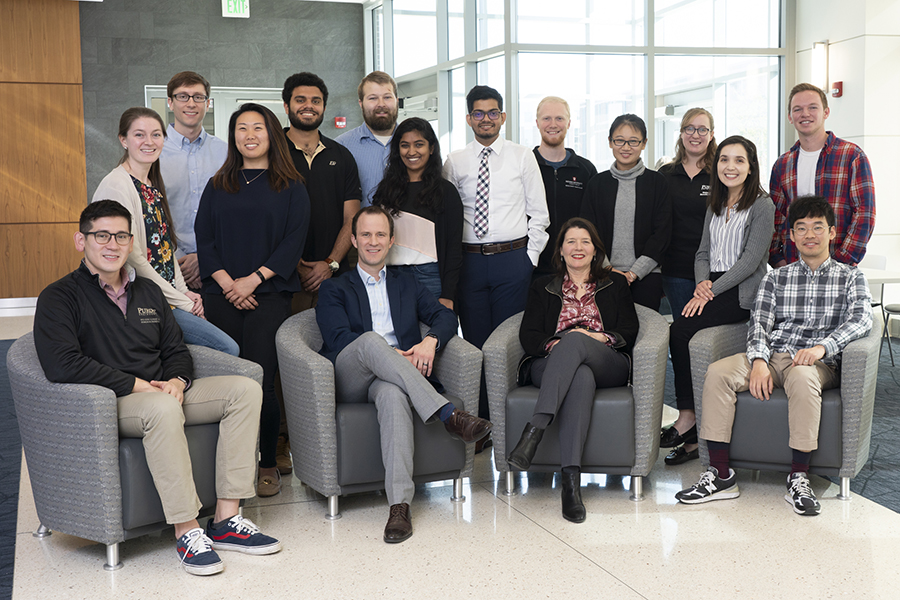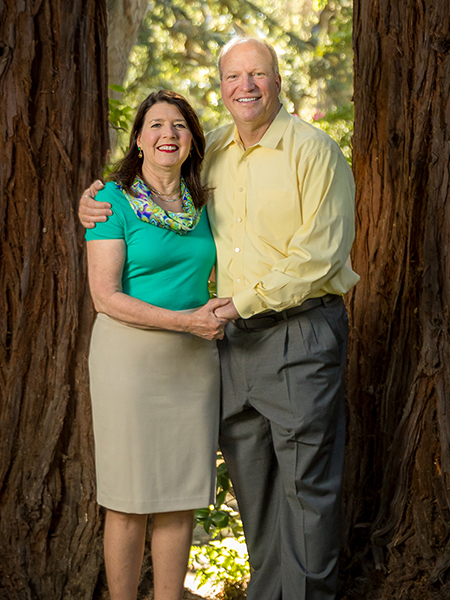Prestigious fellowships named for biomedical entrepreneur and Purdue alumna Leslie Bottorff


Photo: Leslie Bottorff (left) and Stephen Timmerman
Recently, Bottorff pledged an estate gift to the Weldon School of Biomedical Engineering. In addition, she made significant contributions to support the advanced training of biomedical engineering graduate students. Renaming the Innovation for Clinical Translation (ICT) Fellowship confirms Bottorff’s longtime friendship and steadfast commitment to Purdue.
Today, in a unique collaboration between Purdue Engineering and the Indiana University School of Medicine, the graduate fellows will henceforth be known as the Leslie Bottorff Fellows. With her gifts, Bottorff advances all three of the Ever True campaign goals: to place students first, to build on our strengths, and to champion research and innovation.
Professional alignment
Right out of Purdue, Bottorff’s deep understanding of the biomedical device field served her well in sales for GE Medical Systems. She earned an MBA from Harvard Business School in 1985 and spent nearly 20 years in marketing roles for large companies and venture-backed startups. As a venture capital investor at ONSET Ventures, she worked with technical entrepreneurs from the seed stage to develop their business ideas and formulate growth plans. As senior managing director with GE Ventures, Bottorff invested in startups in the burgeoning area of digital health.
George Wodicka, the Dane A. Miller Head of Biomedical Engineering, met Bottorff more than a quarter century ago, before there was a biomedical engineering school at Purdue. “She was one of the very first Purdue graduates with connections to biomedical engineering, and she’s the nicest person I’ve ever met. We became fast friends as she learned of and became involved with the programs we had in the works.”
Fast forward to today: the ICT fellowship naming, officially beginning in November 2019, is directly linked to Bottorff’s nonstop involvement with the school. “We’re trying to align our programs with outstanding people who have had the same professional push in their own lives,” Wodicka says. “The fellows program is an opportunity for our first-year graduate students to undertake clinical immersions at the IU School of Medicine in Indianapolis in areas related to their doctoral thesis research.”
The fellowship immersion ensures that students not only have solid engineering training but also gain exposure to the clinical environment where a new medical technology might be used. That feedback loop will influence design and testing decisions that lead to more successful products. Wodicka says that, given her eye for ideas that might make it from lab to marketplace, Bottorff could offer valuable input to these namesake fellows during her frequent visits to campus.
Clinical immersion
A current fellow in the program is Shruthi Suresh (MSBME ’17), who is easing the lives of people with disabilities. Her first startup, HaptImage, is an image-accessing system that helps students who are visually impaired explore images in real time. This could open up the educational world of STEM (science, technology, engineering and math), which relies heavily on image interpretation.
Suresh also works with her graduate advisor, Bradley Duerstock, associate professor of engineering practice at Purdue, and Thomas Everett, associate professor of medicine at the IU School of Medicine. They are creating a technology, based on artificial intelligence and a wearable device, that can help people with spinal cord injuries. Shruthi is specifically exploring autonomic dysreflexia, a condition that can cause someone’s “fight or flight” responses to kick in inadvertently.
“After an injury, the response doesn’t work the way it’s supposed to,” Suresh says. “Something small might cause the ‘fight or flight’ to go into hyperdrive. It could be fatal if someone cannot manage it properly.”
The fellowship helps her refocus her time in the lab. “I have discovered that the way someone may actually use your product could be very different from what you imagined,” Suresh says.
The $10,000 fellowship also can help with travel and lodging expenses. This is key for program fellow John Damrath, who is working with clinical mentors at both the IU School of Medicine and the Columbia University Irving Medical Center in New York. “We’re looking to improve bone strength in chronic kidney disease patients utilizing a multiscale approach to understanding bone quality,” says Damrath, who observed clinical trials in New York this summer for this National Institutes of Health-sponsored project. “They’re testing the effects of a newer drug on patients who are on dialysis.”
Graduate student fellowships have an exponential effect on the Weldon School — and the College of Engineering itself. For this reason, Mung Chiang, the John A. Edwardson Dean of the College of Engineering, is particularly enthused by gifts such as Leslie Bottorff’s.
“Across the college, we are carrying out a systematic plan to act on further improving the recruitment, education and placement of master’s and doctoral students,” Chiang says. “We aim to achieve the Pinnacle of Excellence at Scale, so we are excited that Purdue Engineering is again ranked among the nation’s top eight in the U.S. News & World Report of graduate engineering programs.”
To support initiatives in the Weldon School of Biomedical Engineering, contact Brian Knoy, chief development officer, at 765-494-6241 or bjknoy@prf.org.
